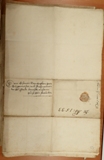Letter #4321
Ioannes DANTISCUS to Gdańsk Town CouncilLöbau (Lubawa), 1533-02-28
| received Gdańsk (Danzig), 1533-03-03 Manuscript sources:
Auxiliary sources:
| ||||||
Text & apparatus & commentary Plain text Text & commentary Text & apparatus
Denn ersamen, namhafften hern
Unsernn freuntlichenn grues mith wylliger erbittung, was wir E(wr) Er(barkei)t liebs unnd guts zcwthun vormugenn, zcuvoran. /
Ersame, namhafftige hernn, / gunstige freunde.
Wir habenn den XX tagk diss mondts unsern eygene(n) bothenn, / wie wir negst / E(wr) Er(barkei)t cf.
Dat(um) uff unserm slosse


 APG, 300, 53, 249, p. 20
APG, 300, 53, 249, p. 20